The 27 Best Black Films of the 21st Century: ‘Black Panther,’ ‘Love and Basketball,’ ‘Moonlight,’ and More
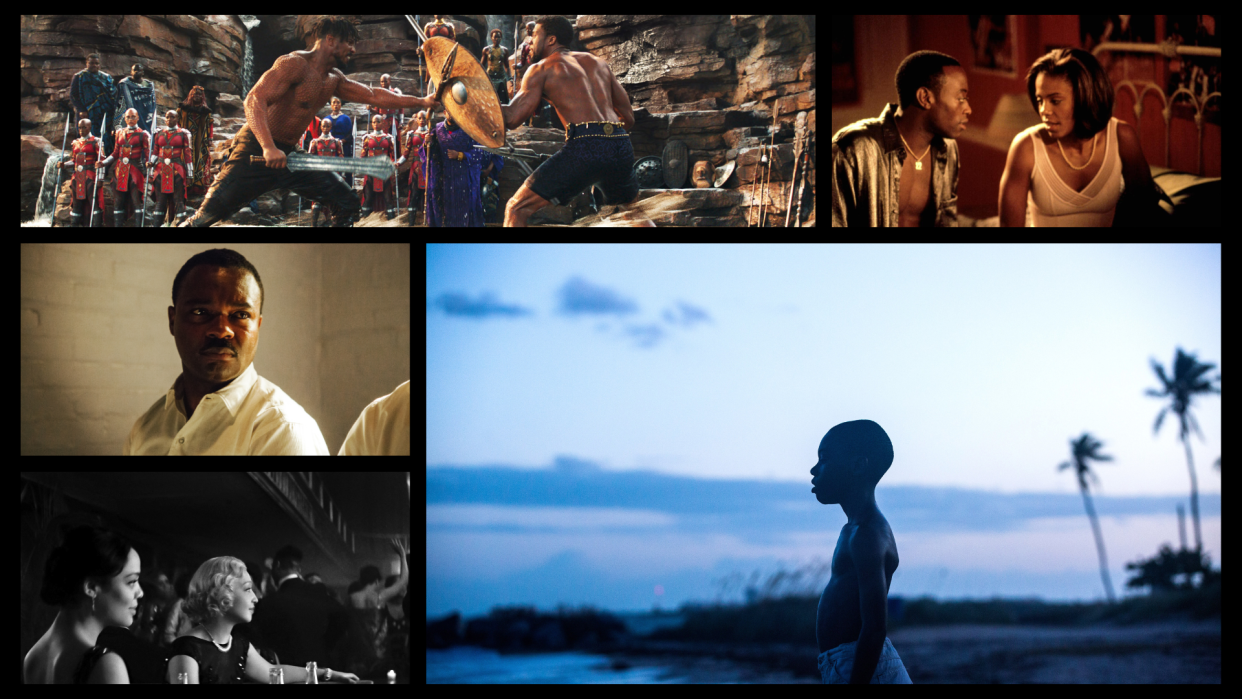
Editor’s note: this list was originally published in February 2024. It has since been updated in honor of Juneteenth.
When putting together a list of the 27 Best Black Films of the 21st century, you first have to recognize that Black entertainers have been a part of cinema for almost as long as it has existed. They have been captured on film riding horses, performing elaborate, elite dance numbers, playing all kinds of streetwise urbanites, or agonized period characters. Yet consistent representation for a diverse array of Black voices at a global scale is a new development — one still with plenty of room for growth and improvement.
More from IndieWire
Not a single Black female director has been nominated for the Best Director Oscar. Of the handful of Black male directors that have been nominated in that category at the Academy Awards, none have won, or have even been nominated for it twice.
All that is to say that with every year Black-led films become more and more undeniable, so when tasked with assembling the Best Black Films of the 21st Century, many of the entries fit just as well with a list of the best films released after 2000, even the best films of all time. There are two Best Picture winners, multiple Best Picture nominees, films that earned historic Oscars for their stars, and films that have earned hundreds of millions of dollars at the box office.
From Sundance to Cannes, horror to action to comedy, independent, experimental, and more, films led by Black casts, and helmed by Black directors have provided some of the most exciting, innovative work in recent history; building upon perspectives audiences have too long been deprived of.
Of course, there are names highlighted that represent the most exciting creative minds working in film right now, such as Ryan Coogler, Jordan Peele, Ava DuVernay, and Gina Prince-Bythewood. But there are also newer filmmakers that one should commit to memory, given some of the notable work they have made in this new millennium. Think Janicza Bravo, or Boots Riley, or Mati Diop, or Cord Jefferson. With Black filmmakers receiving more opportunities to put their art out into the world, compiling the Best Black Films of the 21st Century only becomes more and more difficult, but here is a list of the 25 best, with contributions from various film critics.
With editorial contributions from Jacqueline Coley, Jenna Marotta, Anne Thompson, Wilson Morales, Constance Gibbs.
“Love & Basketball” (dir. Gina Prince-Bythewood, 2000)
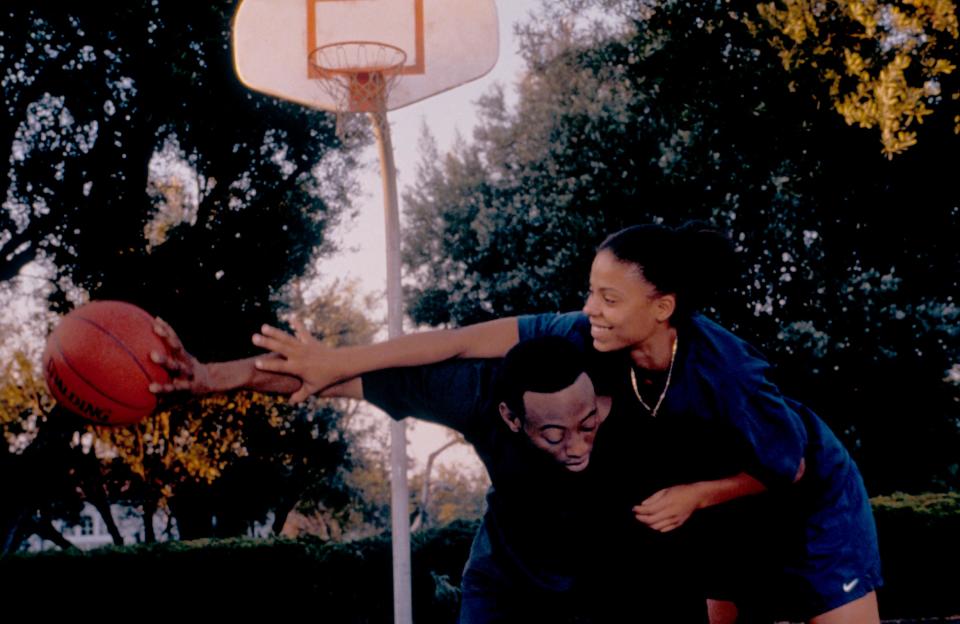
UCLA grad Gina Prince-Bythewood ran track in college. At the center of her first feature, developed at the Sundance Institute’s directing and writing lab and produced by Spike Lee, she put into romantic conflict two L.A. athletes who are childhood sweethearts (Sanaa Lathan and Omar Epps). Over the years, as they play basketball through high school, college and into the professional leagues, they wrestle with complicated issues of love and friendship, competitiveness and gender identity, as they date other people and struggle with making it in the sport they adore. The sports romance broke out its two leads and writer-director, scoring over $27 million at the domestic box office. —AT
“Training Day” (dir. Antoine Fuqua, 2001)
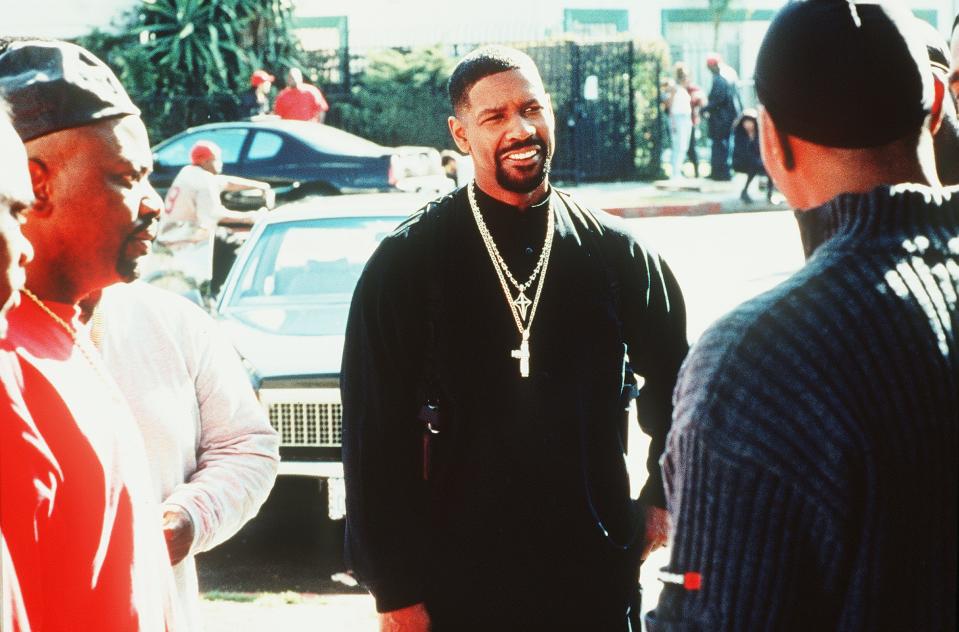
When “Training Day” came out, Denzel Washington didn’t have much left to prove, beyond winning a Best Actor Oscar (he had a supporting trophy for “Glory”). His 1999 performance in “Hurricane” had been overlooked, but then came his four collaborations with Antoine Fuqua. In the first, urban classic “Training Day,” Washington reinvented his persona. As corrupt Detective Alonzo Harris, he finds himself paired with a new partner, Officer Jake Hoyt (Ethan Hawke). During their drives through crime-infested pockets of Los Angeles, Hoyt sees the dirty underworld that Harris loves, and is reluctant to join. He doesn’t know if Harris is his friend or foe. Fuqua made sure this wasn’t your ordinary buddy-buddy action-thriller cop film. In the most memorable scene, Harris proclaims, “King Kong ain’t got shit on me!” We hadn’t seen Washington play the bad guy before, and with his ferocious, dominating, and charismatic performance, the Oscar was his. —WM
“Barbershop” (dir. Tim Story, 2002)
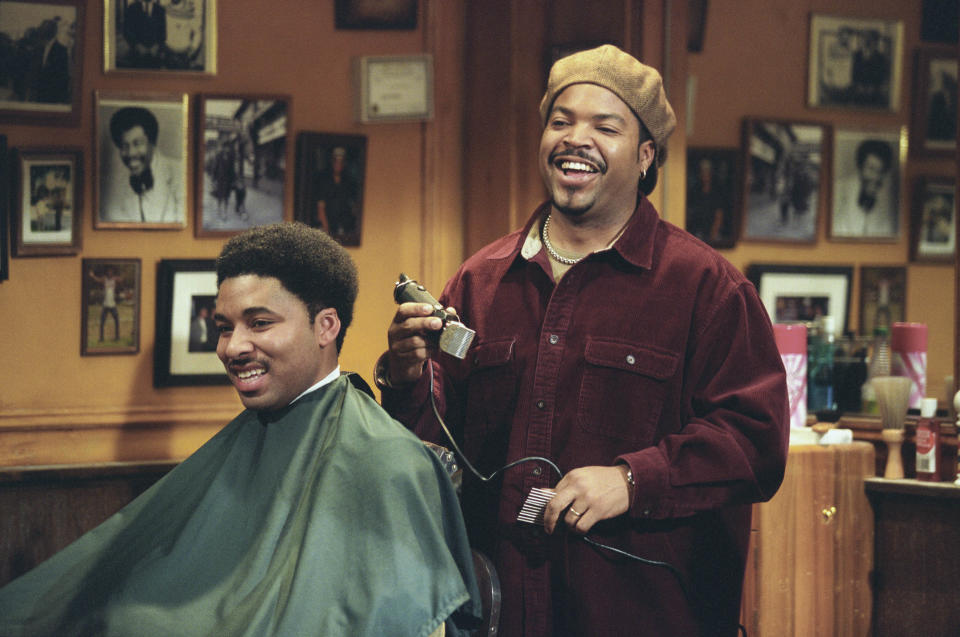
This comedy-drama, featuring Ice Cube, Cedric the Entertainer, Eve, and Michael Ealy, resulted in a humorous and pleasurable film, one that put forth a dialogue with a high sense of realness that folks could relate to. Long before talk shows like “Meet the Press,” there was always a barbershop where people would go and get in on any topic of conversation. Cube plays Calvin, owner of his father’s former Chicago barbershop. Those who work there for a family, even though some are not pulling their weight. Throughout the non-stop jokes and money drama, Calvin has to find within himself whether he has the strength to keep the business afloat when selling out sounds easier. Its $77 million finish at the box office led to a franchise: two sequels (“Barbershop 2: Back in Business, “Barbershop: The Next Cut”) and a spinoff (“Beauty Shop”) for Queen Latifah. —WM
“Inside Man” (dir. Spike Lee, 2006)
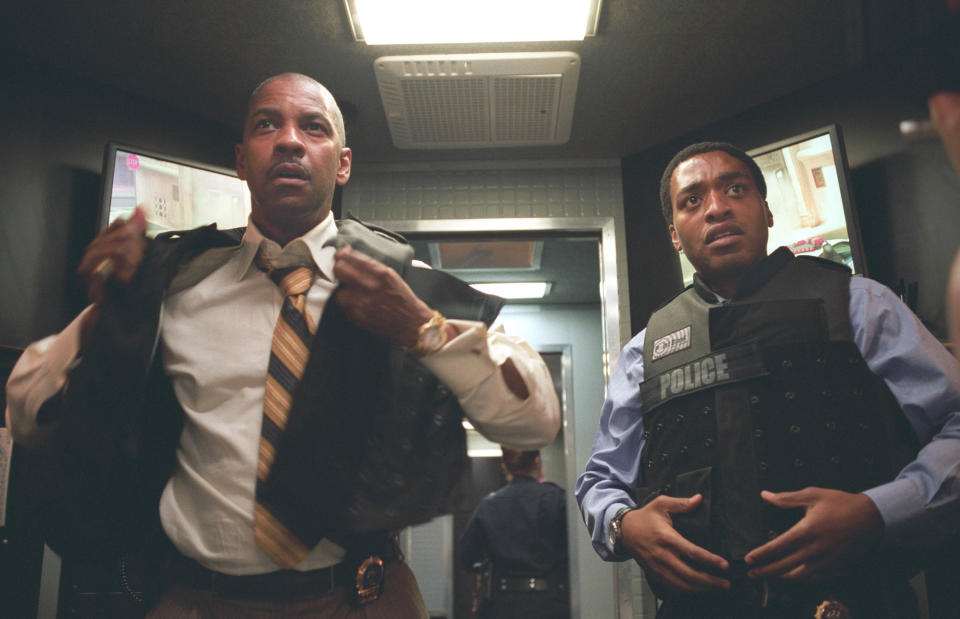
In working with Denzel Washington for the fourth time, Spike Lee had the makings of a hit with the satisfying heist film “Inside Man.” Co-star Jodie Foster was coming off her blockbuster hit “Flightplan,” while Clive Owen was breaking out as an A-list actor. To date, this is the only film where Lee came on board as a hired director; he didn’t write or produce in any capacity. Yet it’s his highest-grossing title, as well as his only film to hit number one at the box office during its opening weekend. Lee has always wanted to make the sequel.
Set in New York, Owen plays a bank robber looking to pull off the perfect theft. He’s thought of every scenario that could go right and wrong, and has to play chess with Washington’s detective. Foster’s slick performance as “fixer” Madeleine White adds to the intrigue and suspense, along with the supporting characters (Willem Dafoe, Chiwetel Ejiofor, and Christopher Plummer). —WM
“Precious” (dir. Lee Daniels, 2009)
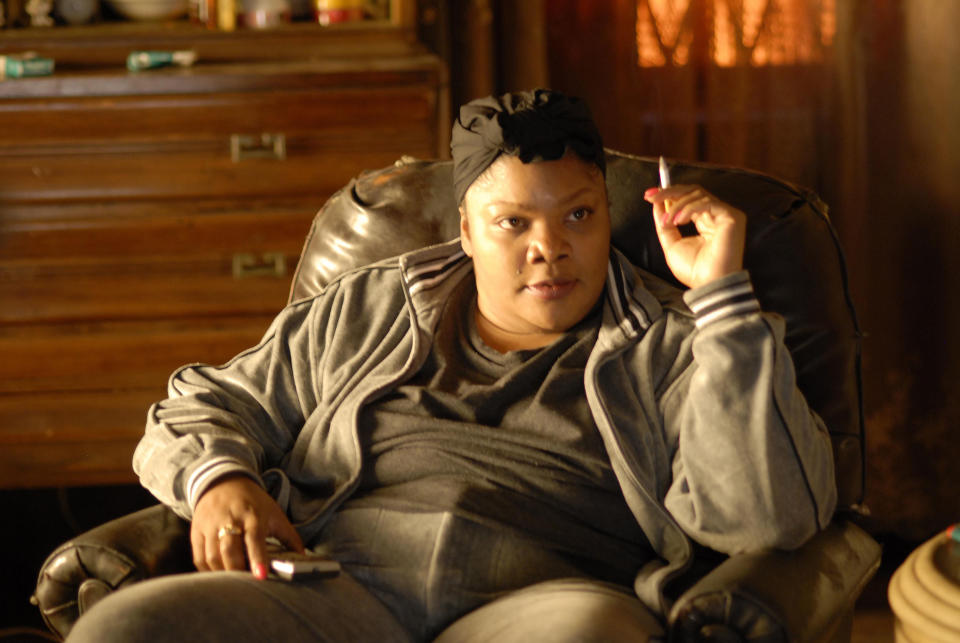
When discussing comedians who became dramatic actors, Oscar winners Robin Williams and Jamie Foxx come to mind, as do nominees Jim Carrey and Steve Carell. But none had a more extreme transformation than Mo’Nique for “Precious.” Based on Sapphire’s 1996 novel “Push” and directed by Lee Daniels, the film cast her as Mary, a hellish Harlem mother who sexually abuses her illiterate teen daughter (newcomer Gabourey Sidibe). Always-bullied Precious has lived a life of continuous trauma, culminating when she learns that her father has given her HIV. But through the kindness of a teacher (Paula Patton), social worker (Mariah Carey), and hospital employee (Lenny Kravitz), she begins to acquire her own agency, eventually severing ties with Mary to become a responsible parent herself.
The jarring film’s production team included Oprah Winfrey and Tyler Perry, each vocal survivors of sexual assault. Mo’Nique won an Academy Award, while a thriving television career (“The Big C,” “American Horror Story,” “Empire”) awaited Sidibe. Today, her self-possessed characters are rarely ever the victims. —JM
“Pariah” (dir. Dee Rees, 2011)
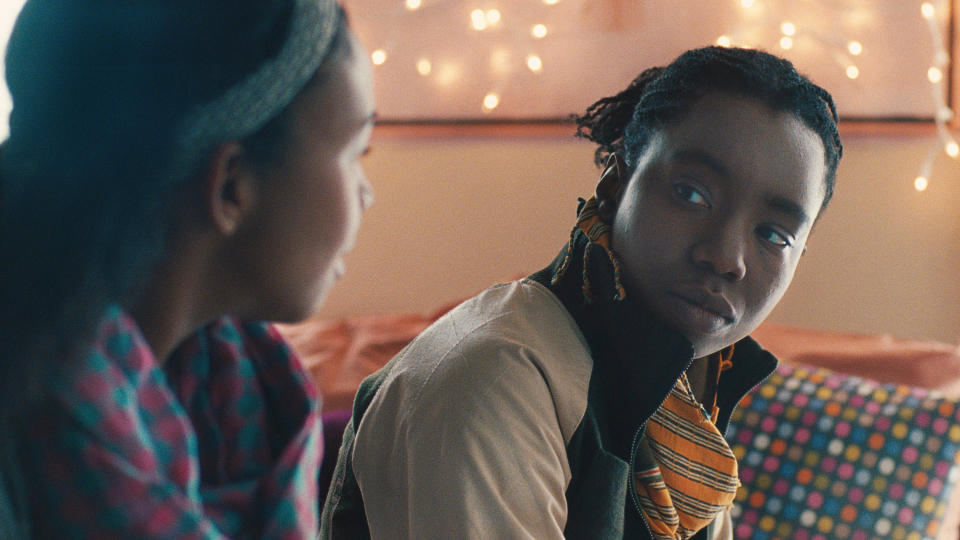
So many black LGBTQ pioneers have enacted social change in the queer community. Marsha P. Johnson was one of the first transgender activists in America. She threw the first stone that kicked off the Stonewall riots. But establishing LGBTQ identity in African American families has always been a complicated endeavor. To this day, far more black youth face stigmatization and ostracization for coming out as gay than their peers in white communities. Dee Rees’ “Pariah,” a raw and intimate look at a young girl’s path to identity and sexuality, is what first introduced audiences to her unflinching lens of examination.
Adepero Oduye stars as Alike, who while seeking love discovers the most elusive love to story fulfill – falling for yourself. From the opening shot, where Alike shyly ogles exotic dancers grinding before her eyes, there is no doubt about her sexuality. Though it takes her longer to admit it to her family, the consequences of her coming out to her religious mother are dire. Still, she remains defiant in the final frames. Reciting her poetry, she proclaims: “I am not broken, I am free,” a universal sentiment for anyone, gay or straight, who remains unapologetic of their truth. —JC
“Fruitvale Station” (dir. Ryan Coogler, 2013)
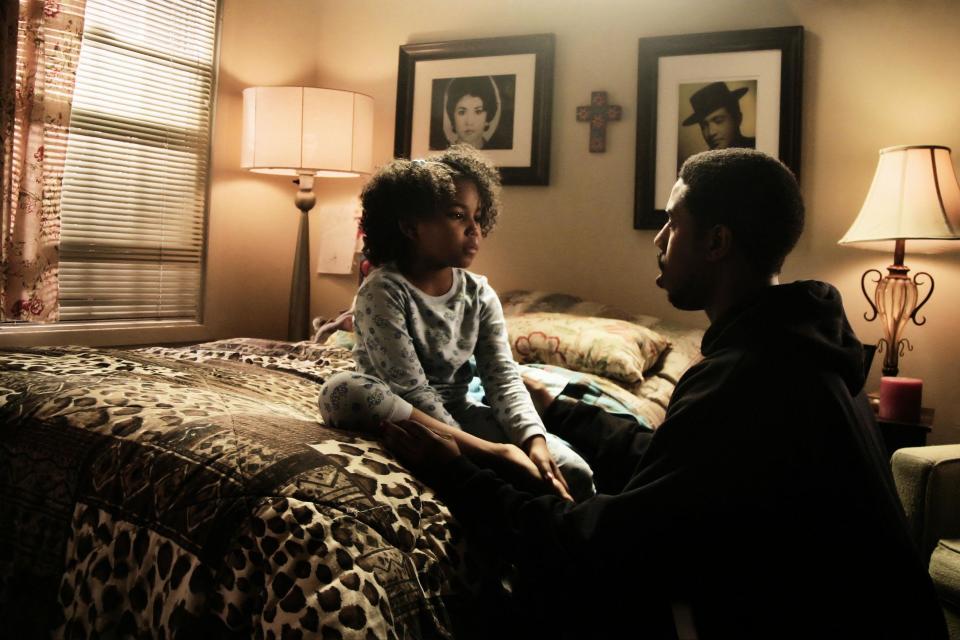
This Sundance Grand Jury Prize and Audience Award winner opens security footage of the real Oscar Grant – shot in the back and killed by a police officer in an Oakland, Calif. train station in 2009 – and closes with a clip of his now-fatherless daughter. For his first full-length film, writer-director Ryan Coogler cast Michael B. Jordan as the slain 22-year-old. The role was complicated, not just because there were surviving relatives to think of, and mounting statistics about how black men fare worse in the criminal justice system than their white counterparts, if they even make it to a court room. In the film, Grant is full of flaws. He’s been to jail, he’s cheated on his girlfriend, he’s been fired from the grocery store where he works. But he’s young, dynamic, and – aware of his family responsibilities – trying to make good choices. That’s how he wound up riding the BART on the last night of his life: it was New Year’s Eve, and he didn’t want to drink and drive. “Fruitvale Station” offers no social remedies, but by recreating Grant’s final hours, it actualizes him as a man, not just a rally cry.—JM
“12 Years a Slave” (dir. Steve McQueen, 2013)
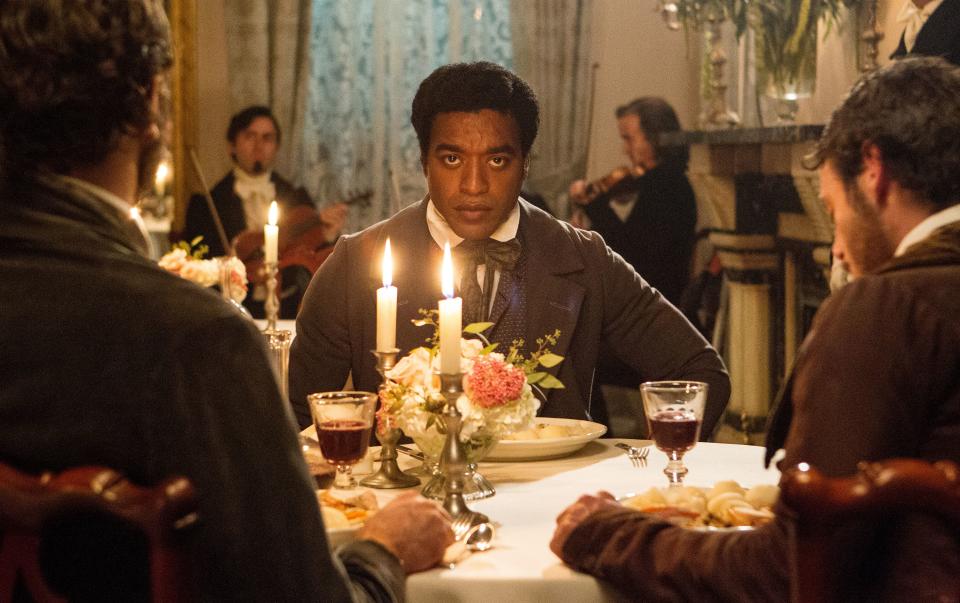
“12 Years a Slave” is powerful and excruciating to watch at the same time. Steve McQueen’s vision of 19th-century slavery, emboldened by first-rate performances by Chiwetel Ejiofor (Solomon Northup), Lupita N’yongo (Patsey), and Micheal Fassbender (Edwin Epps) allowed audiences to witness the degradation of humanity that couples institutionalized oppression. Solomon Northup’s story of adduction and bondage is especially painful today; modern African American viewers can’t help but think, “Is this what would happen to me? Would I attempt to escape? Or would I, like Solomon, eventually bend to my oppressors and try to forget myself as a means of self-preservation?”
The slow dismantling of will is just like a wound, one that throbs with the pain until it eventually heals. Watching Solomon and Patsy fester in the pain Epps inflicts on them leaves little room for solace, but the healing balm of Solomon’s eventual liberation eventually remove the sting. Though not a film many revisit, the final moments — when Solomon reunites with his family — is one that will reverberate for ages. —JC
“Dear White People” (dir. Justin Simien, 2014)
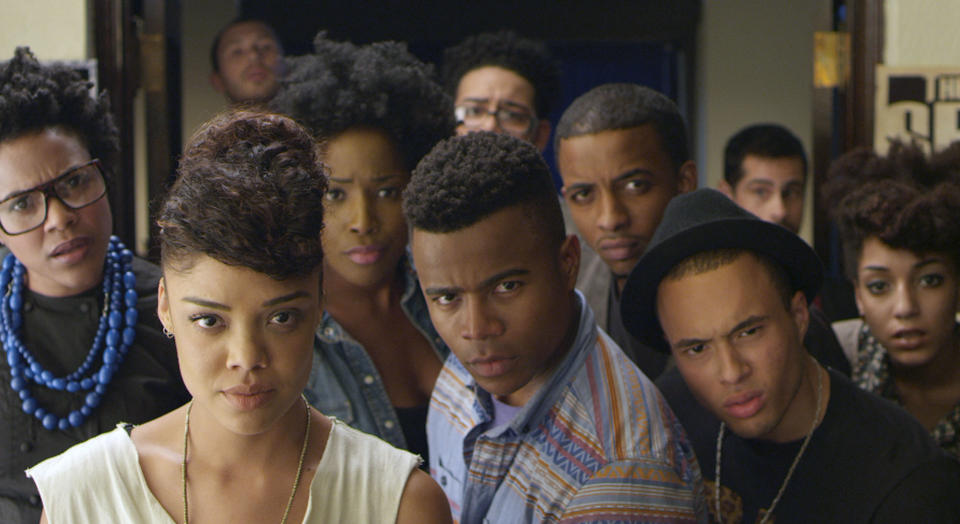
Tessa Thompson, lately of a Marvel tentpole (“Thor: Ragnarock”) and a hit show (“Westworld”), spent almost a decade as a working actor before filming her breakout role in “Dear White People” (2014), writer-director Justin Simien’s Sundance award-winning film that inspired the namesake Netflix series. As Sam White – an acerbic black college student/author who unnerves the white administration with her radio show – she broadcast missives such as, “The minimum requirement of black friends needed to not seem racist has just been raised to two,” and, “Dating a black person to piss off your parents is a form of racism.”
But her narrative is just one of several that forces members of the Winchester University community (and viewers) to question internalized angst about how they are perceived by strangers. Like “Atlanta,” the film explores how two members of the same race can have vastly different experiences depending on how dark their skin is, as well as why certain people can say and act one way, but not others. The racially-tinged hostilities build to a squirm-inducing party where the white school president’s son invites all attendees to wear blackface.—JM
“Selma” (dir. Ava DuVernay, 2014)
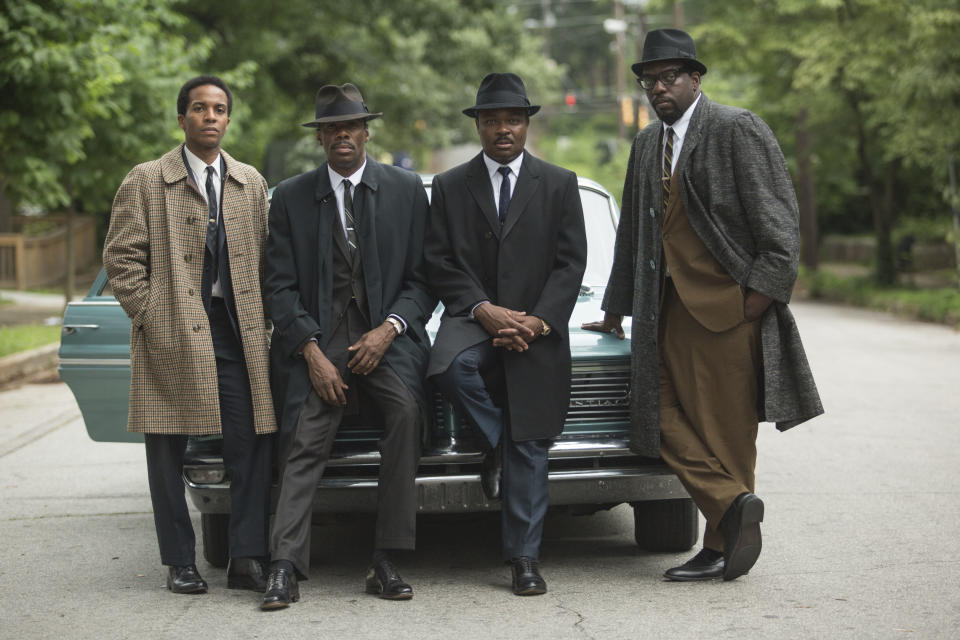
Ava Duvernay picked up a camera for the first time at the age of 32. By 40, she was onset with Oprah Winfrey, directing her and David Oyelowo in the Martin Luther King biopic “Selma.” Though this may seem a meteoric rise, one can’t help but assume if her race and gender had been different, her talent would have her holding a few Oscars (she did get nominated, for documentary “13th”), and helming a Star Wars or Marvel-type franchise. Nevertheless, “Selma” catapulted her into the stratosphere of modern filmmakers.
The most impressive thing about “Selma” is its transformative nature. It turned King into a man with complexities and flaws that are often glossed over in hagiographic Hollywood biopics. More than that, it transformed DuVernay into one of the most talented African American directors of our time. As Spike Lee did with “Malcolm X,” Duvernay forced the audience to look at King from all angles — a luminary whose politics still ignite the black community, but also a man, with personal failings and moments of ungoverned indiscretion. It must have been a daunting challenge to embody all of that, but Oyelowo cleared it with room to spare. When April Reign tweeted in 2015, “#OscarsSoWhite they asked to touch my hair,'” she was making a joke that went viral — but the Academy’s snub of both Duvernay and Oyelowo was anything but funny. The ensuing firestorm sent shockwaves throughout the industry, which still reverberate to this day. —JC
“Creed” (dir. Ryan Coogler, 2015)
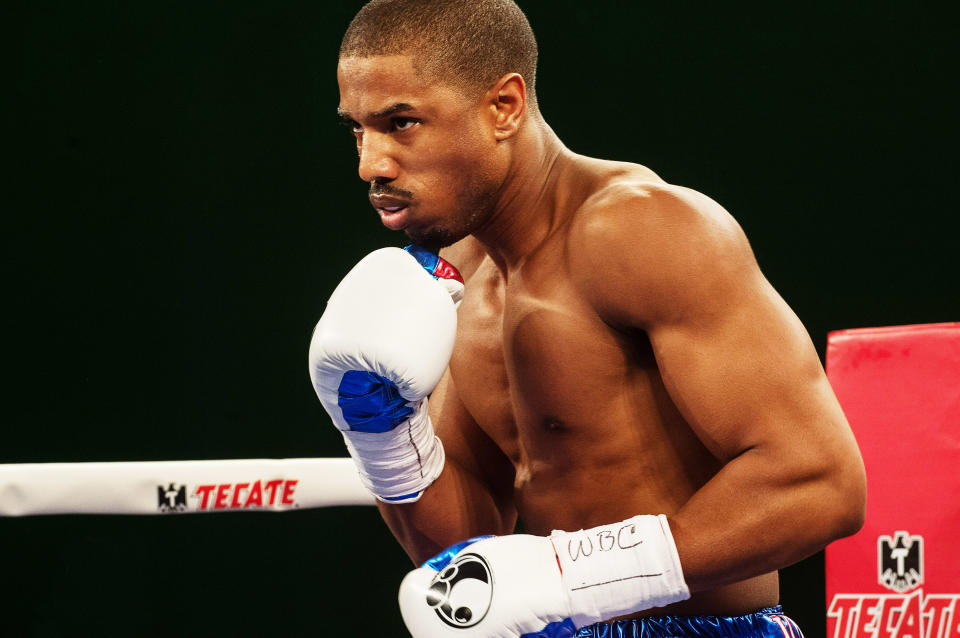
In a sea of poorly made franchise extensions with little in the way of justifications for why they exist, the original “Creed” was like an oasis in the desert: a spinoff with a real point of view on its source material, and a director behind-the-camera with the talent and vision to achieve the set-up’s potential. Ryan Coogler and Michael B. Jordan reunited after “Fruitvale Station” for the 2015 boxing movie, which follows Jordan as iconic “Rocky” opponent Apollo Creed’s son Adonis as he follows in his familial footsteps to enter the heavyweight boxing world. Jordan is dynamite charisma in the role, while Sylvester Stallone has never been better as a washed-up Rocky reluctantly serving as a mentor, and Tessa Thompson dazzles as love interest Bianca. Coogler mixes quite drama and epic, sweaty fight scenes to create one of the best, most purely fun sports movies of the entire 21st-century. —WC
“Moonlight” (dir. Barry Jenkins, 2016)
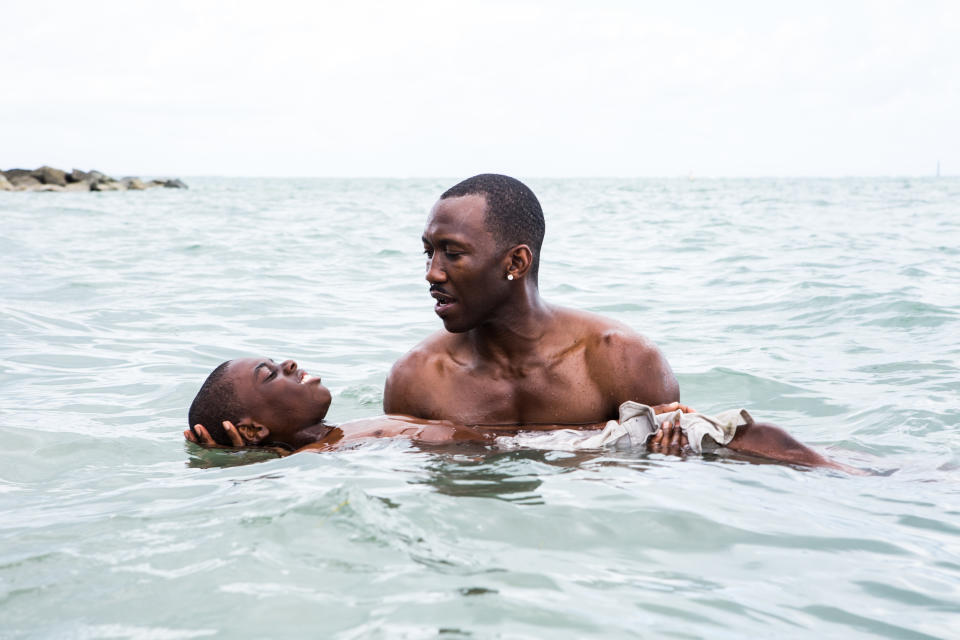
“Moonlight”David Bornfriend/Kobal/REX/Shutterstock
When Barry Jenkins’ “Moonlight” premiered on the fall film festival circuit in 2016, audiences were stunned — unable to fathom what they’d seen, but knowing that it was something that would warrant further examination for years to come. The gay, alienated Chiron was a character never portrayed before in American cinema. Up to that point, the range allowed for black men in American movies could barely span the width of a teaspoon. Though there were outliers, few black characters actually struggled with masculinity, the complexity of identity, love, and oppression with such nuance. It’s not surprising that Jenkins admitted Naomi Harris’ character was a composite of his and co-screenwriter Tarell Alvin McCraney’s mothers, both of whom struggled with drug addiction in South Miami. The narrative transforms an undercurrent of emotional frustration into deep, lyrical beauty. Harris’ vicious-yet-vulnerable turn as Paula, and Mahershala’s Ali masterful, Oscar-winning portrayal of Juan, provide a foundation of support in Chiron’s world that complicates his relationship to it even as darker forces creep in. But it’s the script and overarching aesthetic that made “Moonlight” worthy of its most apt description — a masterpiece. —JC
“Get Out” (dir. Jordan Peele, 2017)
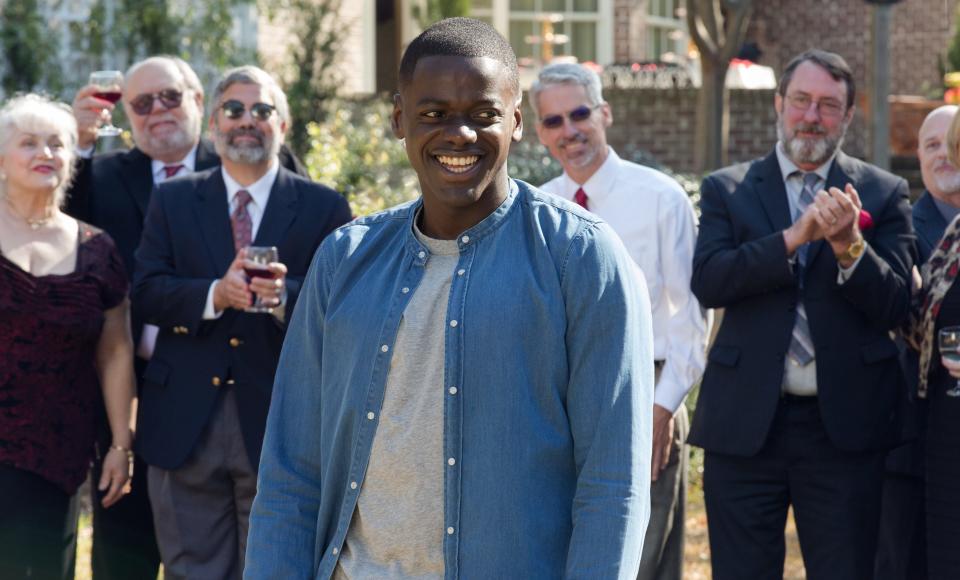
Rookie writer-director Jordan Peele laid the groundwork for his $4.5 million crossover movie by producing, writing, and acting in multiple sketches on Comedy Central’s “Key & Peele” that found the humor in racism. Peele learned, over and over, how to creatively break beyond limitations and play an audience. From the unsettling opening frames accompanied by a series of warning music cues (“Run rabbit run!”), Peele seduces, subverts and manipulates audience expectations — as the masters Alfred Hitchcock, John Carpenter, and Stanley Kubrick did before him. And he uses camera moves to build dread. “Get Out” is both admonition and warning, but it’s also what Peele wants the audience to scream at his frightened everyman hero (Daniel Kaluuya). The rule Peele broke: every movie about race has to have one good white person. Credit producer Jason Blum (who was nominated in 2015 for “Whiplash”) for making sure Peele rejiggered a more satisfying upbeat ending, rather than send his beleaguered hero to jail. Finally, this timely racial thriller, started during the Obama administration and completed in the age of Trump, landed Peele a win for Best Original Screenplay. —AT
“Girls Trip” (dir. Malcolm D. Lee, 2017)
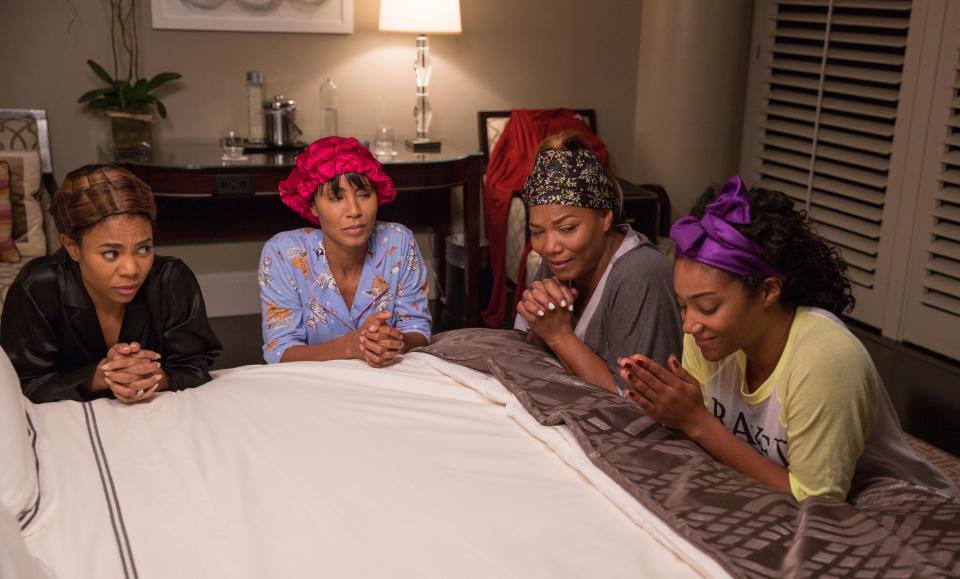
Last year, it took more than seven months for a live-action comedy to score $100 million at the domestic box office. The triumphant film was neither a remake nor sequel, but an original script about a quartet of 30-and-40-something ladies, who visit The Big Easy in bedazzled jackets. Three members of the “Flossy Posse” were onscreen regulars — Jada Pinkett Smith, Queen Latifah, and Regina Hall — while the fourth, Tiffany Haddish, was unknown to most but instantly beloved by all.
Her combined physicality, relatability, and fearless drew comparisons to Melissa McCarthy in fellow R-rated hit “Bridesmaids” (2011). Yet Haddish seems even more fun when she’s not acting, remarkable because she was living out of her car not too long ago. She got away with both a “Jimmy Kimmel Live” anecdote that made Will Smith sound horribly out-of-touch with his ticket-buyers, and an 18-minute speech at the New York Film Critics Circle Awards. In addition to recent appearances in Jay-Z and Drake music videos, this year she’ll star in a TV show and four more films, not to mention host this month’s MTV Movie & TV Awards (a sequel to her breakout is now in development).
Directed by Malcolm D. Lee and co-written by “Black-ish” creator Kenya Barris, “Girls Trip” is an utter delight, even with archetypal characters facing familiar life junctures. But the bond between the four women — and occasional lack thereof — demands repeat viewing much more than the sporadic shocks of gross-out (and grapefruit) humor. —JM
“Black Panther” (dir. Ryan Coogler, 2018)
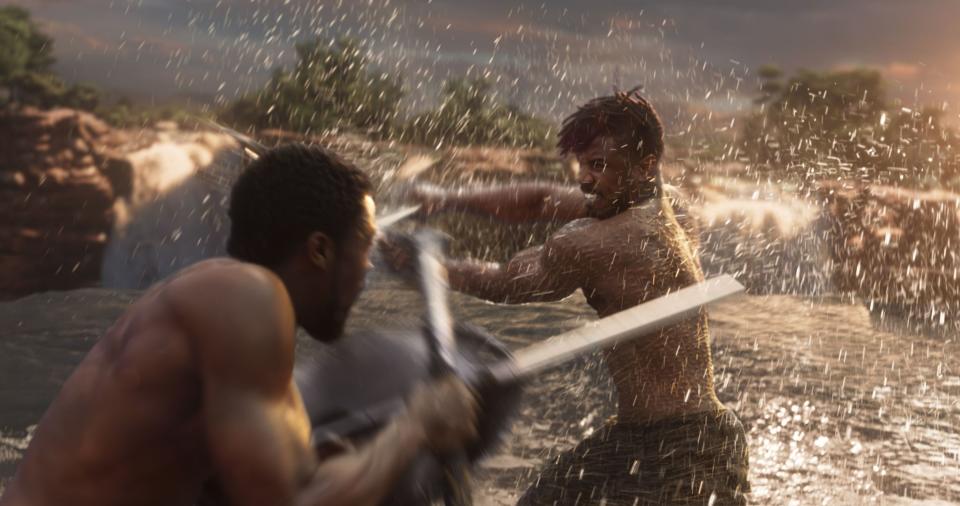
Ryan Coogler was just 29 years old — with two features to his name — when he was announced as the director of “Black Panther.” “Fruitvale Station” (see above) heralded him as an indie darling, an unapologetic new talent who confronts divisive issues and calls out injustice. Then “Creed” proved he could enhance a franchise that pre-dated him (while upending an iconic character for the better), engineer a commercial/critical hit, and earn The Academy’s attention.
But the task of helming Marvel’s first black-led superhero film brought gargantuan expectations, and much room for error. The first moments of “Black Panther” cover thousands of years of history, set to a Kendrick Lamar-curated soundtrack. Soon, the audience meets the five tribes of Wakanda, an African nation others failed to bring to the screen for 25 years. Each man and woman — from Oscar-winners Lupita Nyong’o and Forest Whitaker; to stars Chadwick Boseman, Daniel Kaluuya, and Coogler-requisite Michael B. Jordan — is resplendent in Ruth Carter’s traditional costumes. Indigenous dialects are spoken amid the space flights, museum heists, and car chases. To date, the film has earned more than $1.3 billion worldwide, and inspired a massive awards campaign. Serena Williams, Zendaya, and Octavia Spencer are among those who treated kids to free screenings. Representation-spells-good-business is a refrain that’s become harder to ignore. —JM
“Sorry to Bother You” (dir. Boots Riley, 2018)
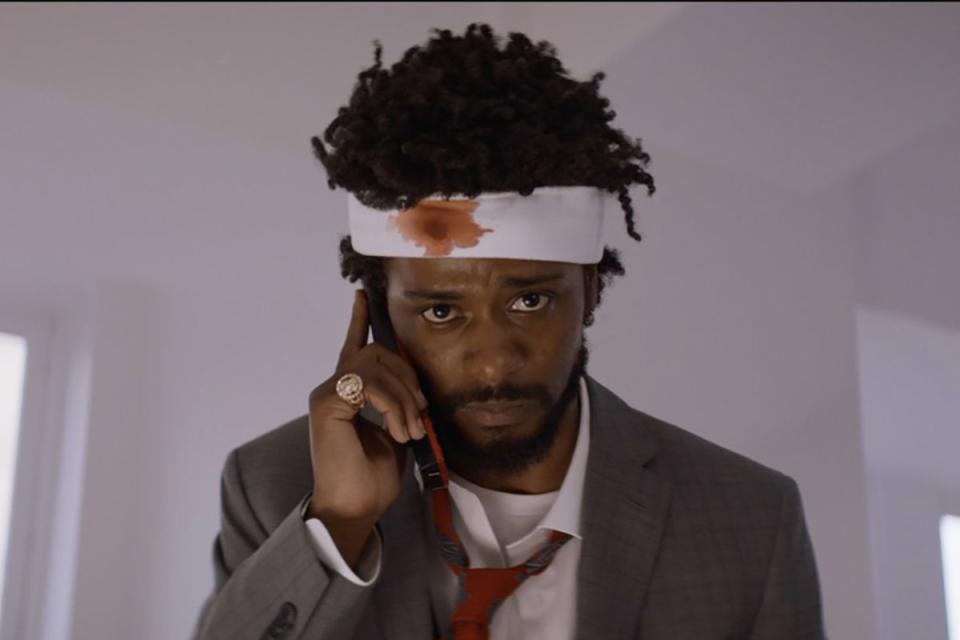
Few pieces of art in recent memory are as audacious as Boots Riley’s “Sorry to Bother You,” a satire of race relations and capitalism that begins as a slightly weird comedy of manners and ends as a chaotic and furious call to action. LaKeith Stanfield stars as Cash, a struggling man living in Oakland who gets a job as a telemarketer, and quickly rises through the company when he develops a “white voice” (courtesy of David Cross) to speak to customers. High on his new success, he gets torn between the corporate world and the grassroots, Union-based activism of his friends. A terrific supporting cast — Tessa Thompson, Jermaine Fowler, Omari Hardwick, Terry Crews, Patton Oswalt, and Steven Yeun — make a meal out of Riley’s surreal, inventive, and unpredictable script, which presents its anticapitalistic messaging with such conviction that it’s hard not to find it inspiring. The term “radical” is used often; “Sorry to Bother You” is one of the rare movies that earns it. —WC
“Spider-Man: Into the Spider-Verse” (dir. Bob Persichetti, Peter Ramsey, and Rodney Rothman, 2018)
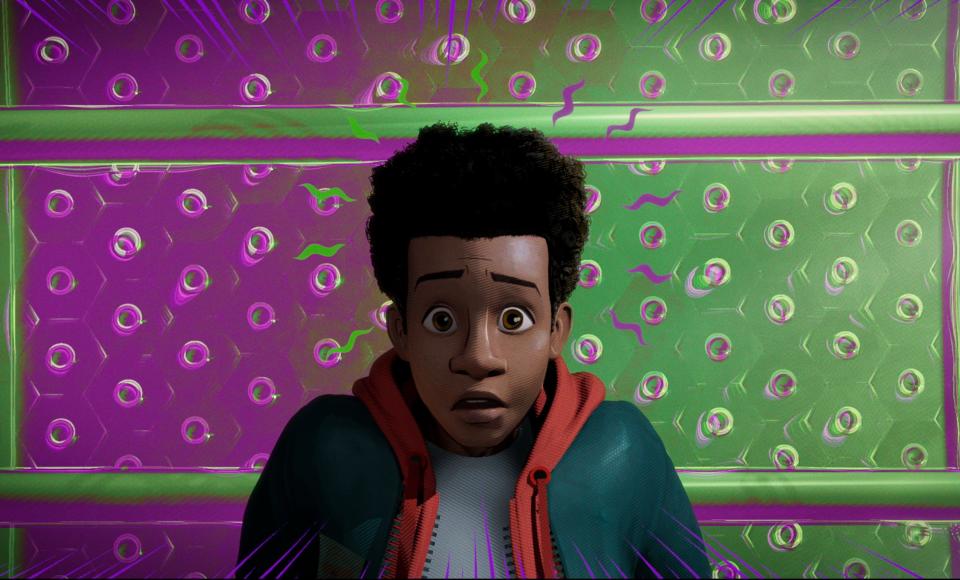
Debuting in 2011 as the second Spider-Man of Marvel’s Ultimate Universe offshoot, Miles Morales received immediate backlash from racists, as a biracial Black and Puerto Rican successor to the white Peter Parker. But the comics starring him received critical acclaim that established him as one of the most beloved new superheroes of his century, and 2018 animated film “Spider-Man: Into the Spider-Verse” demonstrates exactly why he’s such an all-time great superhero. The imaginatively animated and frenetic film follows a multiverse plot as various alternate Spider-Men and Women collide thanks to tears in the fabric of reality. And yet, the movie wisely keeps the focus squarely on Miles, as he attempts to live up to his great potential and become the hero he’s capable of being. “Into the Spider-Verse” won the Best Animated Feature Oscar, and its experimental mix of 2D and CGI animation has steadily influenced many Hollywood cartoons that have come in its wake. But more than just its incredible style, the film soars thanks to its lovely, universal, and heartfelt coming-of-age story, which posits that anyone can be a hero. —WC
“If Beale Street Could Talk” (dir. Barry Jenkins, 2018)
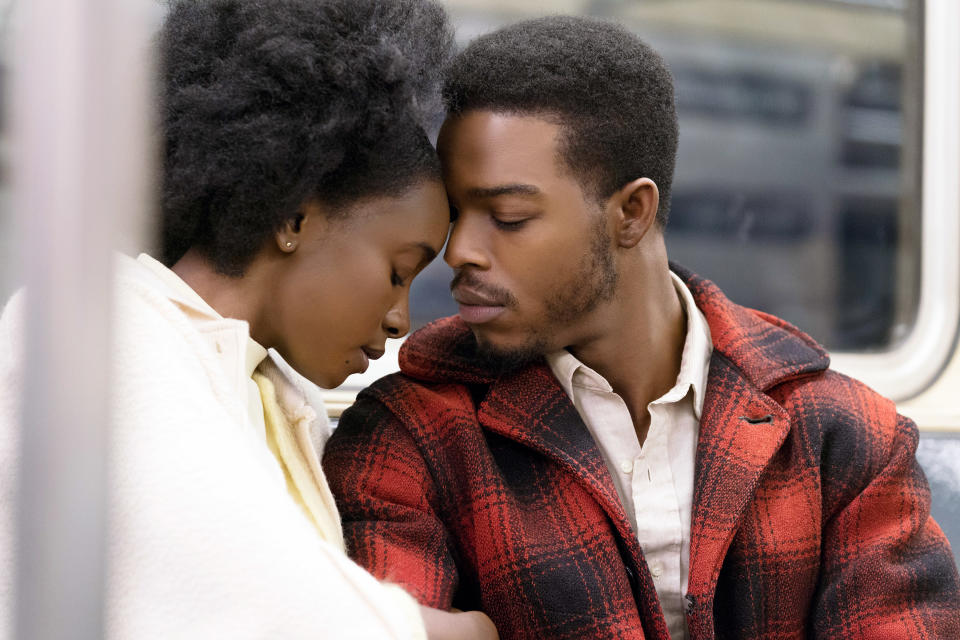
A swoony, heartbreaking romance, “If Beale Street Could Talk” very nearly matches Barry Jenkins’ debut film “Moonlight” in sheer beauty. Adapting James Baldwin’s novel, Jenkins tells the often painful love story between Tish (Kiki Lane) and Fonny (Stephan James), two friends from 1970s Harlem. When Fonny gets arrested for a crime he didn’t commit thanks to the racism of New York’s police department, a pregnant Tish leans on her parents (Colman Domingo and a phenomenal Regina King) to support her and help her clear her fiancé’s name. The film never shys away from the harsh realities that the main characters find themselves in, and yet “If Beale Street Could Talk” is above all else a stunningly romantic story about the perseverance of love — both between the two lovers and the community that supports them in the face of insurmountable odds. —WC
“Atlantics” (dir. Mati Diop, 2019)
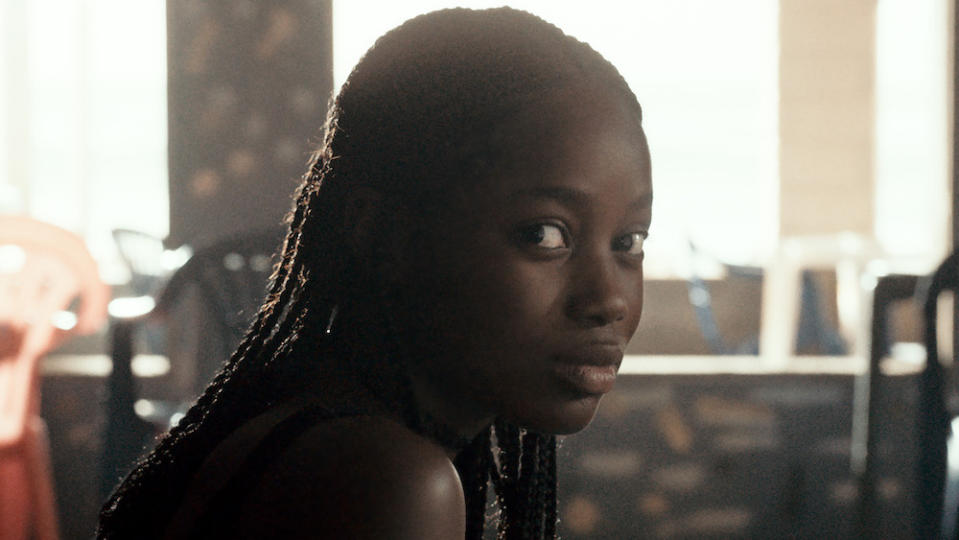
Mati Diop made history in 2019 when her debut feature “Atlantics” premiered in competition at the Cannes Film Festival, becoming the first Black woman in history to have a film compete at the prestigious festival. And while that milestone should have been crossed long ago, “Atlantics” fully deserved its place at the table. An ambitious mix of fantasy and real-world concerns, “Atlantics” stars Mame Bineta Sane as Ada, whose lover Souleiman (Ibrahima Traoré) is a construction crew worker on a futuristic tower being built in their Senegal suburb. One day, the workers abruptly leave for a better future in Spain, only to return as ghosts inhabiting the bodies of the town’s residents. From this heady story, the film tackles themes of class, refugee crises, migration, grief, and change. It’s an unconventional, strange, and singular experience, one that dazzles with its beauty and soul. —WC
“Zola” (dir. Janzica Bravo, 2020)
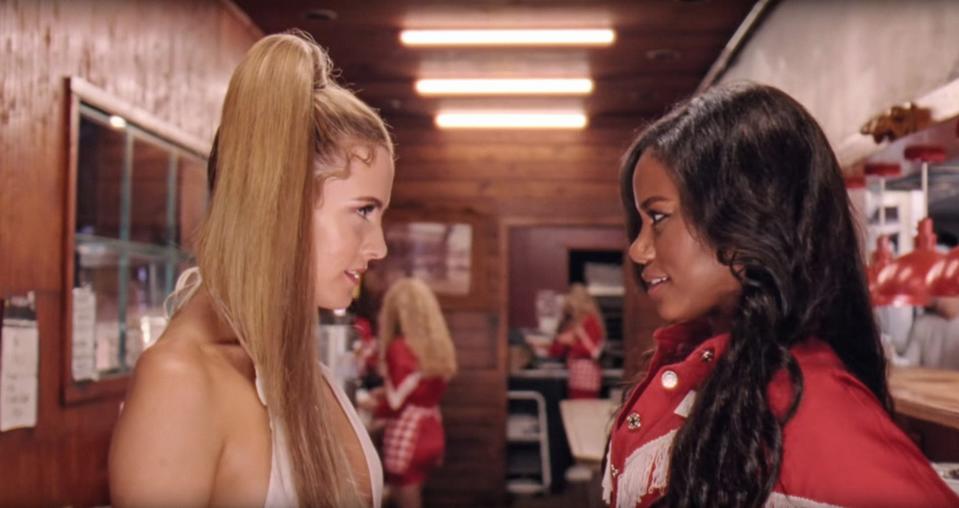
Adapted from the titular bard of Black Twitter’s iconic thread about “why me and this bitch fell out,” with a tight script from director Janicza Bravo and Tony-nominated playwright Jeremy O. Harris, the 2021 A24 release is wicked fun. Led by Taylour Paige, giving a performance that won her the Independent Spirit Award for Best Female Lead, the mostly Florida-set film strikes a unique tone that does not downplay how horrific a trip it is for the protagonist — trapped with her reckless white colleague, her boyfriend, and her pimp. Yet there are so many moments that elicit laughter in just how stranger than fiction their predicament is. —MJ
“Judas and the Black Messiah” (dir. Shaka King, 2021)
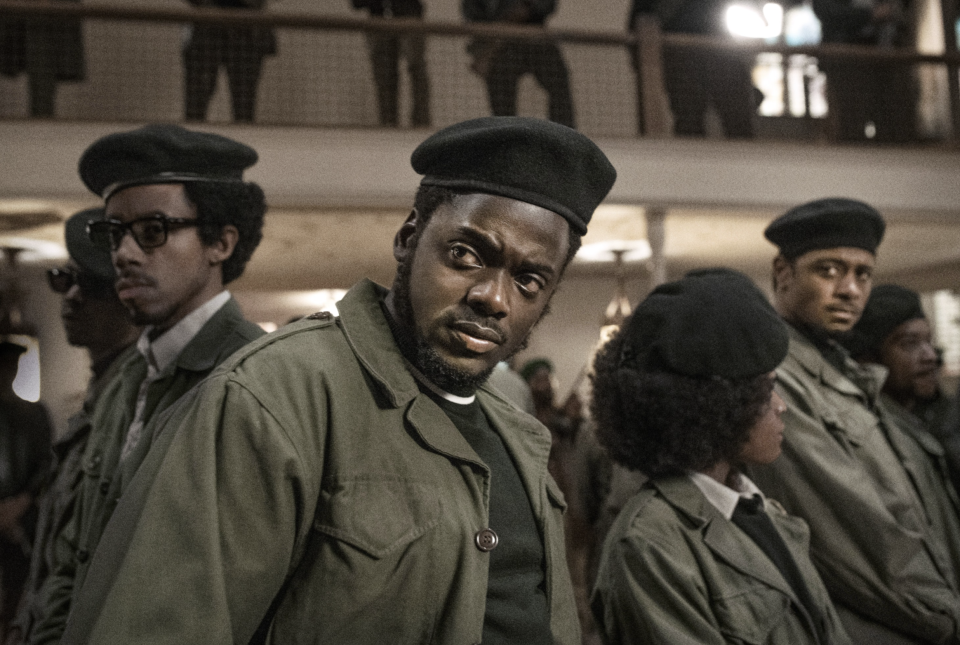
Only the sophomore feature for writer-director Shaka King, this unconventional biopic tells the story of Chicago Black Panther Party leader Fred Hampton through the eyes of the man that infiltrated his inner circle to inform on him to the FBI. In the role of the historical figure is Daniel Kaluuya, who would go on to win the Oscar for his performance, best spotlighted in the scenes that show Hampton as an incomparable orator. But the film is still, at its heart, an extremely tense crime drama led by Lakeith Stanfield embodying the slow and steady crush of his character’s soul. —MJ
“Passing” (dir. Rebecca Hall, 2021)
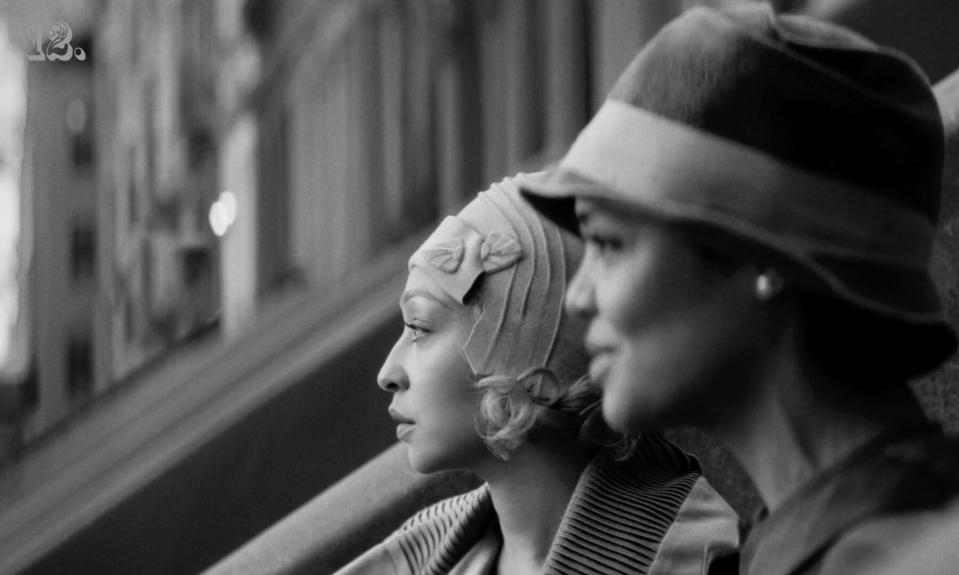
Though “Passing” is a faithful adaptation of Harlem Renaissance figure Nella Larsen’s 1929 novella of the same name, it gains modern resonance from actress-turned-filmmaker Rebecca Hall drawing upon her own family history to make her feature debut. Leads Tessa Thompson and Ruth Negga do wonders to convey the complexity of being a light-skinned individual who leans into passing for white during a time when segregation thrived even in New York City. The Netflix release is an effective melodrama that does not shy away from the absurdity of living a lie that could so easily be exposed by someone of the same background. It goes further, showing how there is an allure to pulling the trick off, granting one more societal privilege at great moral cost. —MJ
“Nope” (dir. Jordan Peele, 2022)
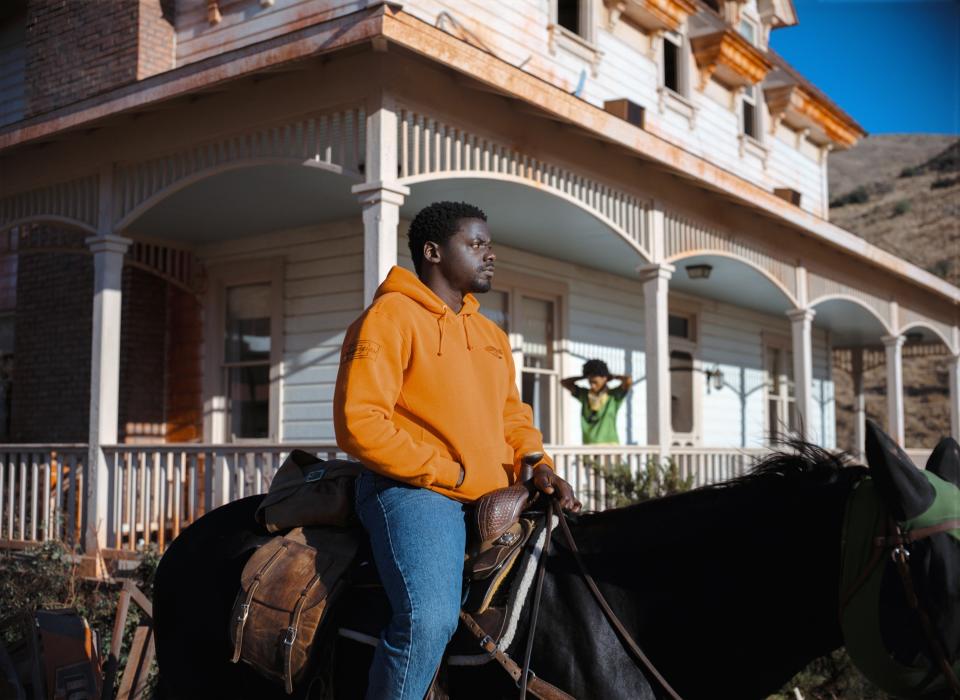
“Nope” and its story of two siblings determined to capture footage of a bizarre UFO they spot in the clouds has sequences that are just as terrifying as Jordan Peele’s first two films “Get Out” and “Us.” But the main takeaway from Peele’s third feature is just how fun it is, a hilarious, thrilling, and epic quasi-Western sci-fi story that features some of the most ambitious stunt work and special effects creations in recent memory. Daniel Kaluuya is affecting as the quiet OJ, who struggles to keep his family’s historical horse rental business afloat and comes up with a get-rich-quick scheme with his cheerful sister Emerald (Keke Palmer, absolutely hilarious) that spirals into disastrous consequences. Steven Yeun, Michael Wincott, and Brandon Perea lead the solid supporting cast of the film, which both acts as a critique of the insidious and dangerous nature of spectacle, and a stunningly creative spectacle itself. —WC
“The Woman King” (dir. Gina Prince-Bythewood, 2022)
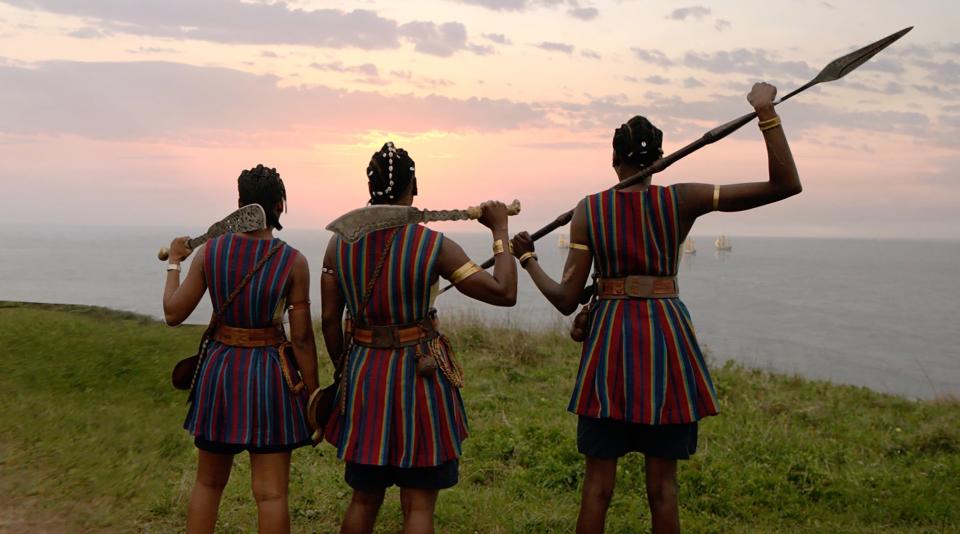
Gina Prince-Bythewood is a director who can do it all: heartfelt love stories (“Love and Basketball,” “Beyond the Lights”), historical dramas (“The Secret Life of Bees”), and gritty action flicks (“The Old Guard”). But even by her own standards, “The Woman King” is a truly ambitious work, a historical epic that shines a light on the little-known story of the Agojie, female warriors who fought for the African kingdom of Dahomey. Viola Davis, in one of her best performances, plays the weary and battle-tested General Nanisca, who trains the next generation of warriors against Portuguese slave traders and develops a testy relationship with a brash new recruit Nawi (an utterly fantastic Thuso Mbedu). A phenomenal supporting cast — including Lashana Lynch, Sheila Atim, and John Boyega — ground the film, which features some of the best shot and choreographed action in recent film memory. “The Woman King” is the kind of thrilling, sweeping historical film for adults Hollywood doesn’t make much of anymore — and never made starring Black women. —WC
“A Thousand and One” (dir. A.V. Rockwell, 2023)
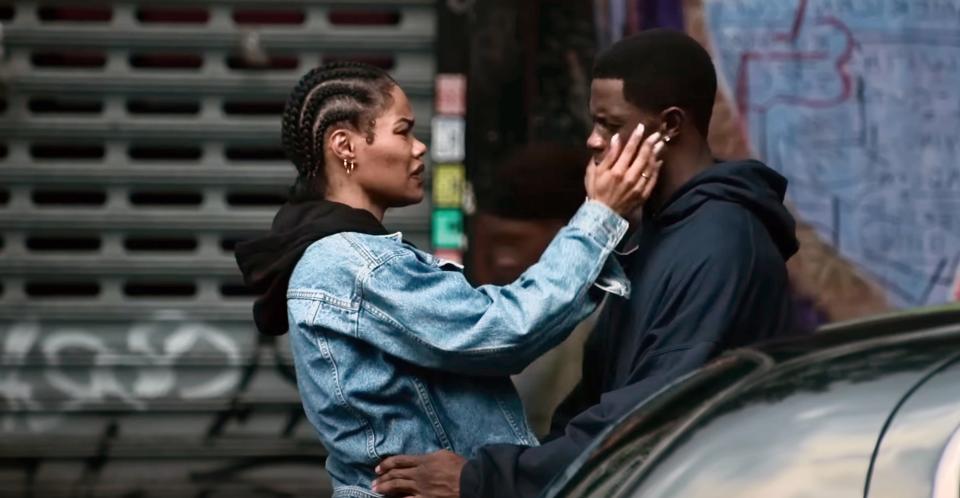
It’s very easy to imagine a version of A.V. Rockwell’s debut film that’s terrible. The story of a hairdresser who kidnaps her son out of the foster care system and spends years attempting to keep her deception a secret, “A Thousand and One” could easily trip into mawkish melodrama and miserablist poverty porn. Instead, the version we do get is one of the best films of its year, thanks to Rockwell’s expert handling of tone. She creates a years-long story that feels intimate and small, never overplaying the emotions of the circumstances that the central mother-son pair find themselves in, and imbues her vision of Harlem with a real sense of history and place. What really lifts the film from good to great, however, is Teyana Taylor’s central performance as Inez. Best known as a musician, Taylor proves to be a formidable actress as the steely yet warm maternal figure, making Inez both one-of-a-kind and the type of person you feel you already know. —WC
“Rye Lane” (dir. Raine Allen-Miller, 2023)
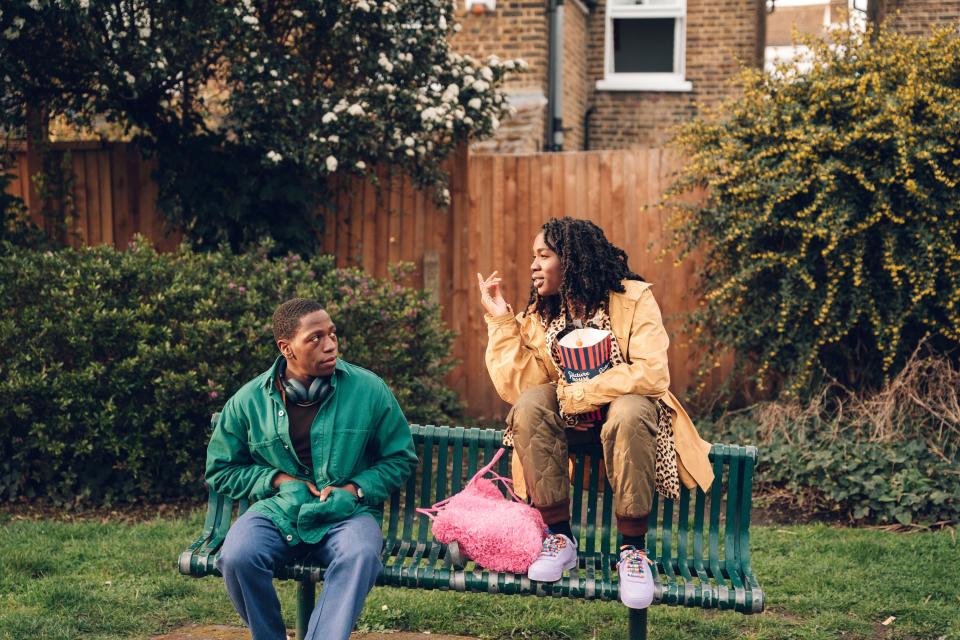
1999’s “Notting Hill” remains one of the most beloved rom-coms of its generation, but even at the time of its release, the lily-white depiction of the traditionally Black neighborhood it’s named after was dinged by critics. 2023’s “Rye Lane” is a refreshing antidote to this traditional rom-com whitewashing, a colorful love story that portrays the diverse South London neighborhoods of Peckham and Brixton with a clear sense of authenticity and knowledge. David Jonsson and Vivian Oparah charm as Dom and Yas, a mismatched pair who meet at a mutual friends’ art exhibition and spend the rest of the day wandering semi-aimlessly through the city streets. Allen-Miller shows a clear fondness for the tropes of the genre, but injects vivid personality and visual imagination into this simple walk-and-talk setup. It’s a heartfelt charmer that calls back to the romantic comedy’s golden age even as it forges its own unique path for itself. —WC
“American Fiction” (dir. Cord Jefferson, 2023)
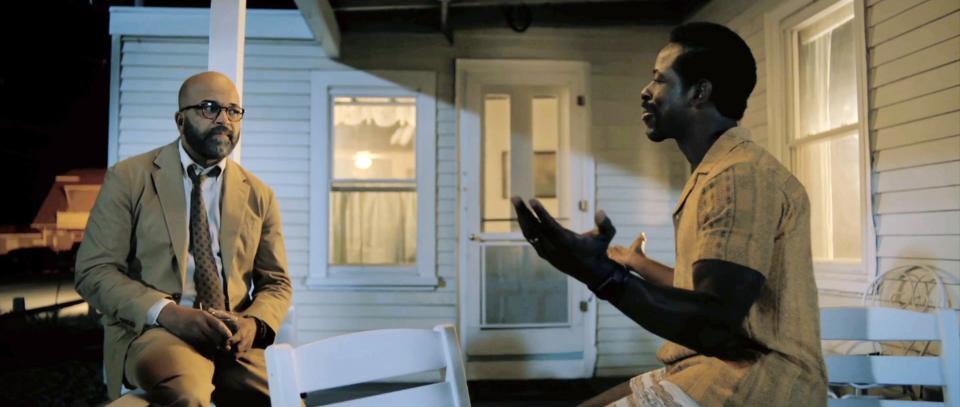
Emmy winner Cord Jefferson’s filmmaking debut is a metanarrative that delivers on the promise of the premise. Based on the 2001 novel “Erasure” by Percival Everett, it on one level criticizes the entertainment world for only greenlighting work from Black creatives that focuses on Black pain. On another level, it is a family dramedy that exemplifies the kind of nuanced, Black-led storytelling its disgruntled novelist protagonist craves. Stars Jeffrey Wright, Sterling K. Brown, Erika Alexander, Issa Rae, Leslie Uggams, and more all make a meal of the meaty roles that showcase a side of their abilities audiences rarely get to see. —MJ
Best of IndieWire
The Best Father and Son Films: 'The Tree of Life,' 'The Lion King,' 'Nowhere Special,' and More
The 51 Best Sexy Movies of the 21st Century, from 'Spring Breakers' to 'X'
The 14 Best Thrillers Streaming on Netflix in June, from 'Fair Play' to 'Emily the Criminal'
Sign up for Indiewire's Newsletter. For the latest news, follow us on Facebook, Twitter, and Instagram.
